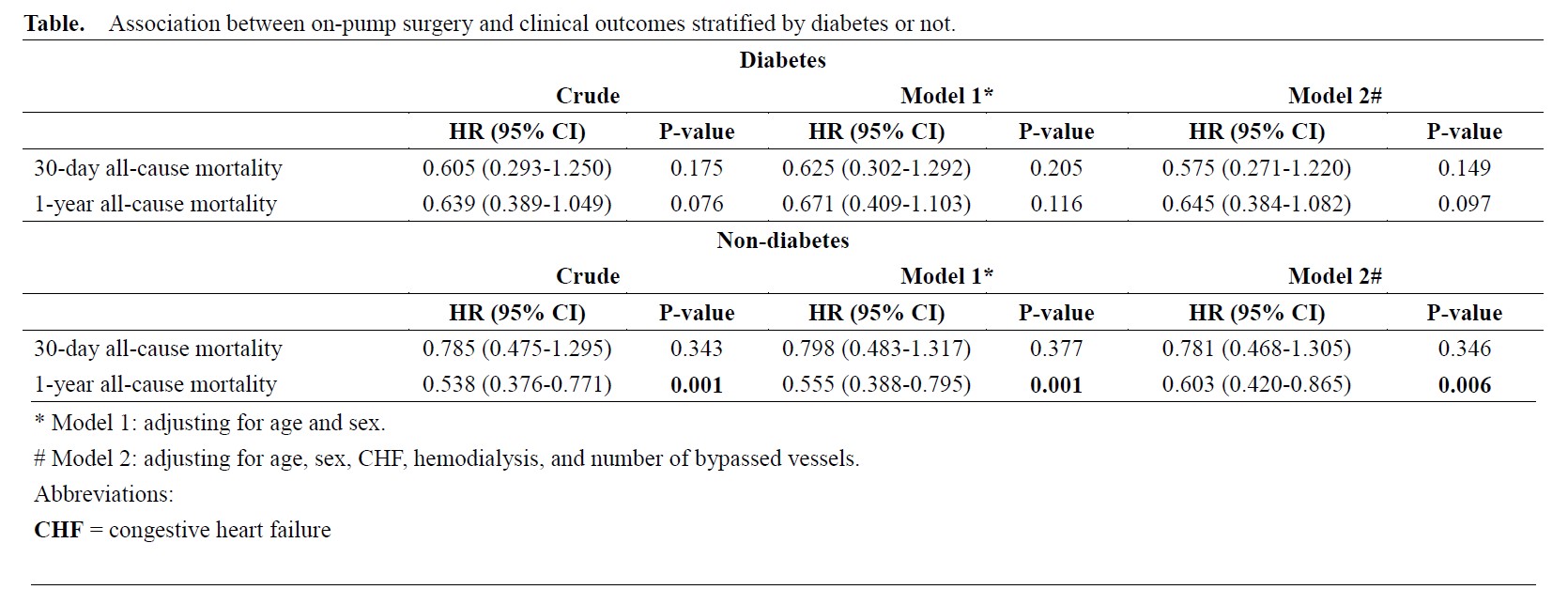Lots of interesting abstracts and cases were submitted for TCTAP 2023. Below are the accepted ones after a thorough review by our official reviewers. Don’t miss the opportunity to expand your knowledge and interact with authors as well as virtual participants by sharing your opinion in the comment section!
TCTAP A-036
Is On-Pump Coronary Artery Bypass Associated With Better Outcome in Patients With Diabetes?
By Yi-Tsang Fu, Hao-Chih Chang, Shih-Hsien Sung
Presenter
Yi-Tsang Fu
Authors
Yi-Tsang Fu1, Hao-Chih Chang1, Shih-Hsien Sung1
Affiliation
Taipei Veterans General Hospital, Taiwan1
View Study Report
TCTAP A-036
Cardiac Surgery/Hybrid Revascularization
Is On-Pump Coronary Artery Bypass Associated With Better Outcome in Patients With Diabetes?
Yi-Tsang Fu1, Hao-Chih Chang1, Shih-Hsien Sung1
Taipei Veterans General Hospital, Taiwan1
Background
The clinical benefits of on-pump coronary artery bypass graft (CABG) surgery remained rebated in diabetic patients with multi-vessel diseases. Therefore, we aim to investigate whether the survival benefit of on-pump CABG surgery differs between patients with and without diabetes.
Methods
Consecutive patients undergone CABG surgery from January 2000 to December 2014 at a tertiary medical center were recruited. Patients who underwent emergent CABG surgery or concomitant valvular surgery were excluded. The primary outcomes were defined as all-cause mortality at 30 days and 1 year after the CABG surgery.
Results
A total of 1635 patients (68.3±11.3 years, 81.1% men, 41%diabetes) were enrolled, and 80.8% of them underwent on-pump CABG surgery. Patients undergoing on-pump CABG were younger and had fewer comorbidities of CKD than those having off-pump CABG. There was no significant difference in 30-day mortality between on-pump and off-pump CABG surgery both in diabetic (4.9% vs 8.1%; P= 0.17) and non-diabetic patients(8.4% vs 10.5%; P= 0.35). However, on-pump CABG surgery was associated with a significantly lower 1-year mortality in patients without diabetes (hazard ratio and 95% confidence intervals: 0.60, 0.42-0.87) after adjusting for age, sex, and comorbidities. In contrast, the 1-year survival rates between on-pump and off-pump CABG surgery were similar in patients with diabetes.

Conclusion
The clinical advantage of on-pump over off-pump CABG surgery was observed in patients without diabetes rather than those with diabetes. Comorbidity with diabetes or not should be considered when determining the ways of CABG surgery.


